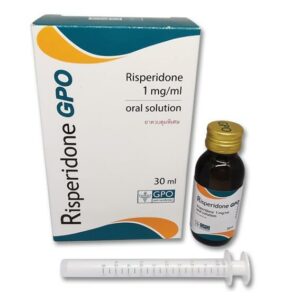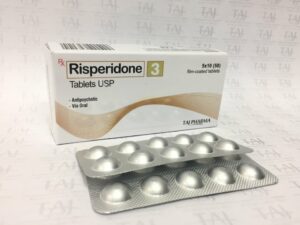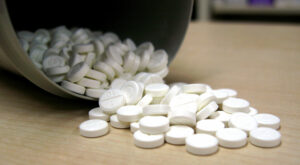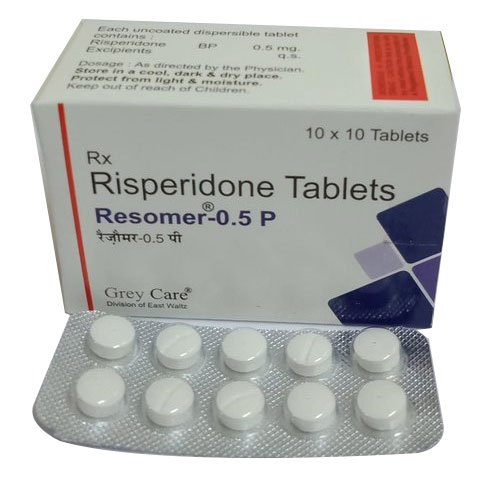The drug risperidone is used to treat schizophrenia, bipolar disorder, and irritability associated with autism. It can also be prescribed for other conditions as determined by your doctor. Some people with mental illnesses take this medicine to stop their hallucinations and other problems. It does this by blocking the dopamine receptors in the brain.
You should not use this drug if you are allergic to it or any of its ingredients. Do not take more than 8 milligrams of this medicine in a 24 hour period. This will make you have seizures or high blood pressure.
Contents
- 1 What Is Risperidone?
- 1.1 How does Risperidone work?
- 1.2 Uses Of Risperidone
- 1.3 Risperidone Dosage
- 1.4 Risperidone Side Effects
- 1.5 How long does Risperidone Last?
- 1.6 Can I Take Drugs While on Risperidone?
- 1.7 Who Should Not Take Risperidone?
- 1.8 When should I expect to see improvement in my symptoms?
- 1.9 Do I need a follow-up appointment?
- 1.10 Can I Take Risperidone With Other Medicines?
- 1.11 Precautions that should be taken
- 1.12 Withdrawal
- 2 Conclusion
What Is Risperidone?
Risperidone is a prescription drug classified as an atypical or second-generation antipsychotics. This medicine is used to treat mental illnesses. It can be used to take care of people who have schizophrenia, bipolar disorder, and irritability that come with autism.
How does Risperidone work?

Risperidone works by blocking the neurotransmitter serotonin. This medicine also blocks the dopamine receptors in your brain. This makes you more alert and can reduce symptoms of schizophrenia. Scientists still don’t really know how atypical antipsychotics work, but they think it might affect several different parts of the brain. They help to reduce symptoms associated with mental illnesses like paranoia, anxiety, aggression, etc. Risperidone has been around since 1993 and it was approved to be used in children 13 years old or younger. But its use is not allowed for children anymore because of side effects like weight gain/loss of appetite. This drug is still used for children but at a lower dose than what it would be given to adults.
Uses Of Risperidone
- Schizophrenia: It is used to treat the symptoms of schizophrenia-like hallucinations, delusions, disorganized thoughts, and behavior.
- Bipolar Disorder: It can be given to people who are manic or depressed. The medicine helps reduce irritability associated with bipolar disorder as well as other mood issues that come along with it.
- Autism: This drug has also been approved to treat irritability and aggression associated with autism.
Other conditions as determined by your doctor.
Risperidone Dosage

The exact dosage of risperidone will depend on the person. The person’s age and any health conditions that they may have will affect the dosage. Your doctor should check your blood while you are taking risperidone. They will do this more often to see if they need to change the amount of medication that you take. Doctors start patients off with a small amount of medicine and gradually increase it until the right balance is found. The maximum recommended daily dose is 16 mg/day.
Risperidone Side Effects
Like all medications, risperidone can cause side effects. The most common ones are:
- Feeling restless or jittery: This side effect is usually mild and goes away after a few days.
- Drowsiness: This is also a common side effect that usually goes away after a while. It can make it hard for you to concentrate or stay awake.
- Dry mouth: This happens because the risperidone blocks saliva production. Drink plenty of fluids to help relieve this symptom.
- Nausea and vomiting: This is a rare side effect, but if it happens, let your doctor know right away.
- Weight gain or loss of appetite: This is also a rare side effect, but it can happen. If you are having problems with weight gain or loss of appetite, tell your doctor.
Less common side effects include:
- Problems with urination: This can include having to urinate more often or hard time starting your urine flow. Let your doctor know if this happens.
- Dizziness: This is when you feel light-headed and have a spinning sensation in your head.
- Blurred vision: If you are seeing double, let your doctor know right away. You may need another type of eye medication.
- Sensitivity to the sun: You may get a rash or feel like you are burning when you are in the sun. Be sure to use sunscreen and stay out of the sun if this happens.
- Problems sleeping (insomnia): This can include difficulty falling asleep or staying asleep. If this happens, tell your doctor.
- Tiredness: Feeling tired is a common side effect of risperidone and other medications for mental illness.
- Sexual problems: This includes reduced sexual desire or the inability to have an orgasm. Talk to your doctor if you are having any problems with sex because there may be other treatments for you.
Other side effects include allergic reactions such as hives, itching or swelling of your tongue and lips, face, neck, or throat; shortness of breath; wheezing; tightness in your chest. If this happens call 911 right away. Serious side effects are rare but can include:
- fever
- stiff muscles
- sweating
- fast or uneven heartbeat
- changes in vision such as blurred vision.
If you experience any of these call your doctor immediately.
How long does Risperidone Last?
Risperidone is a long-acting medication which means it will last for 24 hours in your body. It can take up to four weeks before you start to see an improvement with this medicine. If there are no improvements after six months then the doctor may change or stop your medication completely. This drug should be taken at the same time every day. You cannot drink other liquids, like milk or juice, while you take risperidone. Taking this drug late could make you feel sleepy during the next morning’s activities like school or work so remember to follow dosing times carefully.
Can I Take Drugs While on Risperidone?

It is not safe to take alcohol or other medications while you are on risperidone. This drug can interact with many different drugs and cause serious side effects. Talk to your doctor before taking any medication, even over-the-counter ones. Doctors will tell you if your body can take a certain medicine when it is time for your dose.
Who Should Not Take Risperidone?
You should only use this medicine if the benefits outweigh the risks in your case. Doctors have only studied it a little bit, so they do not know everything about it. Do not give yourself this medication without discussing all of these things first with your doctor:
- current/past medical problems such as heart disease
- high blood pressure
- seizures
- diabetes
- liver or kidney disease
- mental health problems such as suicidal thoughts/attempts, bipolar disorder
- allergies to medications
- risperidone should not be used if you are pregnant or breastfeeding.
- Risperidone is not a cure for mental illness but it can help to lessen the symptoms.
It is important that you discuss all of your concerns and questions with your doctor before starting this medication. They will be able to help you make an informed decision about whether or not risperidone is right for you.
When should I expect to see improvement in my symptoms?
It usually takes at least four weeks to see improvement in your symptoms. Some people who take this medication have said they felt better sooner. You should not stop taking this medicine if you do not feel better right away. The doctor may change or stop your dose depending on how well you are doing after one month of treatment.
Do I need a follow-up appointment?
Some doctors want their patients to take risperidone for six months and then come back. They do this before the patient stops taking the medicine. If there have been no improvements by this time, new options will be discussed. These could include another type of medicine or even surgery. Other doctors might want to keep checking on their patient’s progress while they are on risperidone. When you get new medicine, it is important that you find a doctor that you trust. You will feel more comfortable with him or her and the medicine will work well for you.
Can I Take Risperidone With Other Medicines?
It is very important that your doctor knows about all the other medicines you take. This includes medicine that the doctor has prescribed and other drugs such as vitamins, herbal remedies, and non-prescription medications. This drug can interact with many different medications so it’s best to have your doctor review them all before starting this medicine. If any of these conditions appear while taking risperidone call your doctor right away:
- worsening symptoms such as hallucinations (seeing things or hearing voices)
- a high fever
- extreme tiredness
- stiffness in the neck
- severe headache
- vomiting and/or diarrhea that lasts for more than 24 hours
Precautions that should be taken

- Follow your doctor’s instructions about taking risperidone.
- Do not drink alcohol or take other drugs while on this medication.
- Take the medicine at the same time each day.
- Tell your doctor if you have any medical problems. Especially tell her if you have a problem with your heart, high blood pressure, seizures, diabetes, or another disease in the liver or kidney.
- You might not feel better after four weeks on the medication. But keep taking it anyway. You should feel better in four weeks. Your doctor may change or stop your dose depending on how well you are doing after one month of treatment.
Risperidone can interact with many different medications so it’s best to have your doctor review them all before starting this medicine.
Withdrawal

You should not stop taking this medicine if you do not feel better right away. The doctor might change the dose of your medication, or stop it entirely. The doctor will look at how well you’ve been doing after one month of treatment to decide.
Some people who take risperidone have side effects. These can include feeling drowsy, restless, constipated, or having problems with ejaculation (ejection of semen). Other common side effects include weight gain and changes in blood pressure. Less common but more serious side effects include tardive dyskinesia (a movement disorder), neuroleptic malignant syndrome (a life-threatening condition that includes high fever, muscle stiffness, and confusion), and a decrease in the number of white blood cells. In this case, you might need to stop the medicine so talk with your doctor first before stopping this medication.
Keep in mind that risperidone is not a cure for mental illness but it can help lessen symptoms. It is important that you discuss all of your concerns and questions with your doctor before starting this medication. They will be able to help you make the best decision for your health.
Conclusion
Risperidone is a medication that treats schizophrenia, bipolar disorder, and irritability associated with autism. Doctors can prescribe this for people with severe depression. People use it when other treatments did not work. This drug may cause side effects. It can make you confused, have trouble urinating, gain weight and feel sleepy. You should only take it with a doctor’s supervision. This medicine may make people who take it happily. But there are also some bad side effects. People might get an increased risk for things like obesity and diabetes mellitus type 2 which could make them feel worse over time. Therefore, you should only consider this medication if all other options have failed or if the benefits outweigh the risks.
If you are looking for affordable Online Counseling MantraCare can help: Book a trial therapy session


